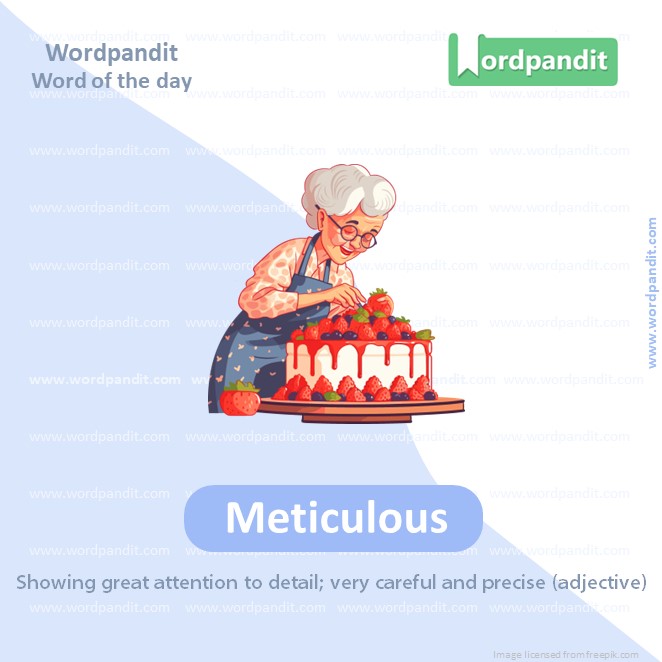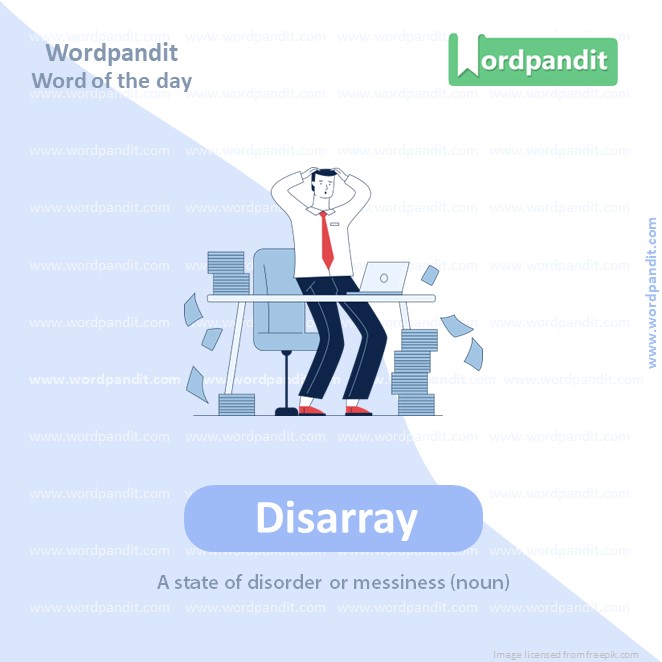Daily Vocabulary from Indian Newspapers and Publications
Welcome to Wordpandit’s Indian Vocabulary Hub
At Wordpandit, we understand the importance of staying rooted in the local context while expanding your language skills. This section focuses on enriching your vocabulary with words and phrases drawn from India’s leading newspapers and publications, ensuring you're learning vocabulary that is practical, relevant, and uniquely Indian.
Why Indian Sources Matter
We believe that the best way to master any language is by immersing yourself in local content. That’s why we carefully curate vocabulary from top Indian publications, including:
- The Hindu
- The Times of India
- The Economic Times
- Hindustan Times
- Live Mint
- The Indian Express
- And many others...
Stay Updated, Stay Relevant
With daily updates from Indian news sources, you’ll be consistently learning words that reflect the trends and shifts in Indian society and culture. Our focus is to provide vocabulary that enhances your understanding of the language in an Indian context.
How Wordpandit Supports Your Goals
Whether you’re preparing for exams, aiming to improve your professional communication, or simply want to stay connected with the latest Indian vocabulary, Wordpandit is here to guide you every step of the way.
Learn with a Practical Approach
Our interactive learning methodology includes real-world examples, engaging activities, and context-specific usage to ensure that every word becomes part of your active vocabulary.
Dive into Indian Vocabulary Today!
Why Choose Wordpandit?
Practical Learning: Focus on words you'll actually encounter in real-world reading, enhancing your comprehension and communication skills.
Diverse Content: From current affairs to scientific breakthroughs, our varied sources expose you to vocabulary across multiple domains.
Effortless Integration: Make Wordpandit a part of your daily routine. Just a few minutes each day can significantly boost your lexicon over time.
Your Path to Vocabulary Mastery
- Visit our Daily Vocabulary section regularly
- Explore new words and their usage in context
- Practice incorporating these words into your own writing and speech
- Track your progress as your vocabulary expands
Start Your Journey Today
Embark on your vocabulary enhancement journey with Wordpandit. By consistently engaging with our daily posts, you'll build a robust vocabulary that serves you well in academic, professional, and personal contexts.
Remember, a word a day keeps linguistic limitations at bay. Make Wordpandit your daily companion in the quest for vocabulary excellence!
WORD-1: Wandering
Context:
"If he was bent on wandering off again just before a general election, then he should have had the political sense to begin the yatra in Ayodhya so that he could have stolen some of Narendra Modi’s thunder." - Indian Express
Explanatory Paragraph:
"Wandering" typically refers to moving about without a specific destination or clear purpose. In the given context, it metaphorically points to a lack of political focus or direction. Whether used literally for physical movement or figuratively for indecisiveness or lack of commitment, "wandering" often implies a sense of aimlessness or distraction.
Meaning: Moving from place to place without a fixed course or purpose (Verb/Adjective)
Pronunciation: WAHN-dur-ing
Difficulty Level: ⭐⭐ Basic
Etymology: From Old English *wandrian*, meaning "to move about aimlessly."
Prashant Sir's Notes:
The word is commonly used both literally (e.g., travelers, explorers) and metaphorically (e.g., a wandering mind, wandering thoughts). In politics, it can reflect unpredictability or inconsistency in strategy or messaging.
Synonyms & Antonyms:
Synonyms: Roaming, meandering, drifting, rambling, straying
Antonyms: Settled, focused, directed, purposeful
Usage Examples:
- He spent years wandering through remote villages, learning their customs and stories.
- Her thoughts kept wandering during the long, boring lecture.
- The dog was found wandering near the highway and was taken to a shelter.
- The politician’s wandering campaign confused even his closest supporters.
Cultural Reference:
"Not all those who wander are lost." – J.R.R. Tolkien, *The Fellowship of the Ring*
Think About It:
Can wandering—whether physical or mental—be a necessary part of discovery and growth, or does it always indicate a lack of direction?
Quick Activity:
Write two sentences: one using "wandering" literally (about a person or animal), and one using it metaphorically (about thoughts, ideas, or behavior).
Memory Tip:
Think of “Wander” as “WONDER” without direction — when you wonder too much, your mind starts to wander!
Real-World Application:
In resumes and job interviews, a "wandering" career path can sometimes raise red flags, unless it's framed as exploration or gaining diverse experiences. Being aware of how "wandering" is perceived can help tailor narratives more effectively.
WORD-2: Embraced
Context:
"What stood out to me was how well the team embraced expectations." - Indian Express
Explanatory Paragraph:
"Embraced" refers to the act of willingly accepting or supporting something with enthusiasm or positivity. In the given context, it means that the team not only accepted the high expectations placed upon them but also welcomed and rose to meet them with confidence and readiness. It can also literally mean holding someone closely, like a hug, but here it is used in a metaphorical sense to express acceptance and commitment.
Meaning: Accepted or welcomed something enthusiastically or willingly (Verb - past tense)
Pronunciation: em-BRAYSD
Difficulty Level: ⭐⭐ Basic
Etymology: From Old French *embracer*, from Latin *bracchium* meaning "arm" – originally referring to putting your arms around someone or something.
Prashant Sir's Notes:
"Embraced" is a powerful verb used to express full acceptance of ideas, responsibilities, changes, or even people. It carries a sense of readiness and positive attitude, making it a great word to use in motivational or leadership contexts.
Synonyms & Antonyms:
Synonyms: Accepted, welcomed, adopted, supported, endorsed
Antonyms: Rejected, resisted, avoided, opposed
Usage Examples:
- She embraced the new role with determination and enthusiasm.
- Despite the challenges, he embraced change rather than fearing it.
- The company embraced innovation as a core part of its strategy.
- He warmly embraced his friend after seeing him years later.
Cultural Reference:
"To improve is to change; to be perfect is to change often." – Winston Churchill. Leaders often embrace change to grow and lead effectively.
Think About It:
What is something in your life that you initially resisted but later embraced — and how did it change you?
Quick Activity:
Write a short paragraph about a time when you embraced a new challenge. Focus on your feelings and the outcome.
Memory Tip:
Imagine literally opening your arms wide to 'embrace' something new — whether it’s an idea or a person. That physical image helps lock in the emotional and figurative meaning!
Real-World Application:
In professional settings, candidates who have embraced diversity, change, or feedback are often seen as adaptable and emotionally intelligent — qualities highly valued by employers and teams alike.
WORD-3: Meticulous
Context:
"The final result doesn’t take away all the meticulous planning which made India the team to beat — since the Asia Cup." - Indian Express
Explanatory Paragraph:
"Meticulous" describes someone or something that shows great attention to detail, precision, and care. In the context of the sentence, it highlights the thorough and well-thought-out planning behind the Indian cricket team's performance. Even though the outcome may not have been perfect, the meticulous groundwork laid since the Asia Cup is still praiseworthy and foundational to their success.
Meaning: Showing great attention to detail; very careful and precise (Adjective)
Pronunciation: muh-TIK-yuh-luhs
Difficulty Level: ⭐⭐⭐ Intermediate
Etymology: From Latin *meticulosus*, meaning "fearful" or "overly concerned," from *metus* meaning "fear." Over time, it evolved to mean someone who is careful to the point of perfectionism.
Prashant Sir's Notes:
Use "meticulous" to describe tasks or people who are highly organized, detailed, and thorough — especially when precision is important. It’s commonly used in professional, academic, and creative fields.
Synonyms & Antonyms:
Synonyms: Thorough, precise, careful, detailed, exacting
Antonyms: Careless, sloppy, haphazard, negligent
Usage Examples:
- Her meticulous notes made studying for the exam much easier.
- The architect reviewed every design element with meticulous care.
- He planned the wedding meticulously, down to the color of the napkins.
- Meticulous editing ensured there were no typos in the final manuscript.
Cultural Reference:
Steve Jobs was known for his meticulous attention to detail in Apple product design, from fonts to packaging — a quality that became central to Apple’s brand identity.
Think About It:
Can being too meticulous slow down creativity or innovation, or does it enhance quality and trust?
Quick Activity:
Pick a daily activity (like cooking, organizing your desk, or writing an email) and try doing it as meticulously as possible today. What changes?
Memory Tip:
“Meticulous” sounds a bit like “tick” — imagine ticking off every single detail on a checklist. That’s being meticulous!
Real-World Application:
Being meticulous is a highly valued trait in professions like architecture, medicine, law, science, and editing — where even the smallest mistake can have major consequences.
WORD-4: Disarray
Context:
"The first time at the World Cup, they threw our plans into disarray and we couldn’t counter theirs." - Indian Express
Explanatory Paragraph:
"Disarray" refers to a state of disorder, confusion, or mess — both in physical situations and in plans or systems. In the context of the World Cup, it suggests that the team's carefully structured plans were disrupted or thrown off-track, leaving them unprepared or unsettled. It paints a picture of chaos or strategic breakdown, especially in contrast to the opponent’s more effective game plan.
Meaning: A state of disorder or confusion (Noun)
Pronunciation: dis-uh-RAY
Difficulty Level: ⭐⭐⭐ Intermediate
Etymology: From Old French *desaree*, based on Latin prefix *dis-* meaning "apart" + *aree* from *arraier*, meaning "to arrange." So, *disarray* literally means “un-arranged.”
Prashant Sir's Notes:
“Disarray” is a useful noun to describe any kind of disruption — in military terms, strategy, business, or even personal routines. It has a strong visual impact and can be used to express unexpected chaos or confusion.
Synonyms & Antonyms:
Synonyms: Disorder, chaos, confusion, mess, turmoil
Antonyms: Order, organization, system, structure
Usage Examples:
- The sudden resignation of the manager threw the entire office into disarray.
- The storm left the festival grounds in total disarray.
- The opponent’s unexpected strategy put our game plan in disarray.
- Her thoughts were in disarray after hearing the shocking news.
Cultural Reference:
In 2020, during the early days of the COVID-19 pandemic, global supply chains were thrown into disarray, leading to shortages and economic disruption — a powerful real-world example of the word in action.
Think About It:
Is disarray always negative, or can it sometimes lead to innovation and change?
Quick Activity:
Describe a time when a plan of yours fell into disarray. What caused it, and how did you recover?
Memory Tip:
Think of “disarray” as “dis+array”—when things are no longer arrayed (i.e., neatly arranged), they’re in disarray!
Real-World Application:
Understanding and managing disarray is a key leadership skill — whether in crisis management, team dynamics, or handling unexpected challenges in business or sports.
WORD-5: Aviation
Context:
"As far as aviation is concerned, developing sustainable aviation fuel is a long way off." - Indian Express
Explanatory Paragraph:
"Aviation" refers to the operation, design, production, and management of aircraft — everything related to flying and air travel. In this context, it is specifically highlighting the challenges the aviation industry faces in transitioning to sustainable, eco-friendly fuels. The word encompasses commercial, military, and private aircraft and is increasingly discussed in environmental and technological innovation spaces.
Meaning: The operation and development of aircraft and the systems related to air travel (Noun)
Pronunciation: ay-vee-AY-shun
Difficulty Level: ⭐⭐ Basic
Etymology: From Latin *avis* meaning “bird,” combined with the suffix *-ation*; the word emerged in the early 20th century as flight became a human achievement.
Prashant Sir's Notes:
"Aviation" is a high-utility noun in discussions around technology, transport, climate change, and innovation. It's also useful in business, engineering, and policy contexts. Look out for compound uses like "aviation industry" or "aviation technology."
Synonyms & Antonyms:
Synonyms: Air travel, flight, aeronautics, aerospace
Antonyms: Ground transport, seafaring, maritime (context-dependent)
Usage Examples:
- The aviation industry is investing heavily in eco-friendly aircraft technology.
- She studied aviation engineering and now works with a major airline.
- Global aviation was severely impacted during the COVID-19 pandemic.
- The museum showcases the history of aviation from the Wright brothers to modern jets.
Cultural Reference:
The Wright brothers, credited with inventing and flying the first successful airplane in 1903, are iconic figures in the history of aviation.
Think About It:
Can the future of aviation ever be fully sustainable, or is air travel inherently harmful to the environment?
Quick Activity:
Name three ways in which aviation impacts your daily life — directly or indirectly.
Memory Tip:
Think of "aviation" like “aviary” — both come from *avis*, Latin for bird. Aviation is how humans imitate birds in flight!
Real-World Application:
Aviation is a critical sector for global connectivity, logistics, tourism, and defense. Innovations in this field affect everything from how we travel to how quickly goods move around the world.



















